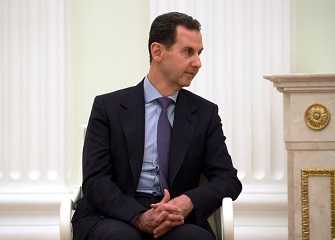
BEIRUT, May 9 (Reuters) - Having brought President Bashar al-Assad in from the cold, Arab states want him to rein in Syria's flourishing drugs trade in exchange for even closer ties. But as Damascus makes its own demands, the way ahead appears far from simple.
Arab states turned the page on years of confrontation with Assad on Sunday by letting Syria back into the Arab League, a milestone in his regional rehabilitation even as the West continues to shun him after years of civil war.
But Arab leaders are seeking a price for re-engagement, notably a halt to the production and smuggling of the amphetamine captagon, which the West and Arab states say is being exported around the region from Syria.
Alongside the return of millions of refugees who fled Syria, the captagon trade has become a big worry for Arab leaders, on a par with their concern about the foothold established by Shi'ite Islamist Iran in the Arab country.
While denying any role in the trade, for which Syrian officials and Assad relatives have faced Western sanctions, Damascus has sought leverage from the issue.
Foreign Minister Faisal Mekdad told his Arab counterparts at a May 1 meeting that progress on curbing captagon depended on Arab pressure on the United States to ease sanctions, according to three sources briefed on the meeting.
He also linked the return of refugees to funds for rebuilding Syria, from which more than 5 million people have fled into neighbouring states during the war that has killed hundreds of thousands of people.
The sources spoke on condition of anonymity. One of them described the meeting in Jordan as "quite tense", saying Arab ministers were disturbed by Mekdad’s tone.
AIR STRIKES
The meeting attended by ministers from Egypt, Iraq, Saudi Arabia and Jordan produced a statement in which Syria agreed to help end drug trafficking and to work over the next month to identify who was producing and transporting narcotics.
Underlining deep Arab concern over the issue, Jordan carried out air strikes in Syria on Monday, killing a Syrian narcotics smuggler and hitting a factory linked to the Iran-backed Lebanese group Hezbollah, local and intelligence sources said.
Hezbollah, which deployed fighters to Syria to aid Assad's war efforts, has denied any role in the drugs trade.
Aided by Iran and Russia, Assad steadily beat back his rebel enemies, some of whom had support from U.S.-allied Arab states that have now restored ties. They include Saudi Arabia, which is also mending ties with Assad's ally Iran.
The war has shattered Syria's once productive economy, demolishing infrastructure, cities and factories.
Captagon has long been a lucrative part of Syria's war economy, estimated to be worth billions of dollars a year.
Jordan has told Syria it views drugs as a threat to its national security, a senior Jordanian official said.
"The pressure on the border is huge and these are not gangs. It’s clearly supported by Iran-backed militias entrenched within the state," the official said.
'READY TO INVEST'
A regional source close to Damascus and a Syrian source close to the Gulf with knowledge of contacts said Saudi Arabia, a big market for captagon, had proposed compensation that would come as aid for the loss of the trade in the event it stops.
The regional source said Riyadh had offered $4 billion, based on an estimate of the value of the trade.
On Wednesday, an official source at the Saudi Foreign Ministry denied there was talk of funding between Saudi Arabia and Syria. "The kingdom has not offered $4 billion to Syria," the official said.
The Saudi government's communication office did not respond to earlier emailed questions seeking comment for this story.
The Syrian government did not respond to a request for comment.
A Gulf Arab diplomat in the region said: "They must stop exporting drugs, and they know that the Gulf are ready to invest when there are signs that this is actually happening".
Two Western sources with knowledge of Arab contacts with Syria said a pay-off would be necessary to peel state-linked armed units away from the captagon trade.
The United States, United Kingdom and European Union have all placed new sanctions on Damascus in recent weeks over captagon. They specifically accuse Maher al-Assad – Bashar’s brother and the head of the army's Fourth Division – of facilitating the production and trafficking of captagon.
The United States has said it will not normalize ties with Assad and its sanctions remain in full effect.
Speaking to reporters last month, U.S. assistant secretary of state Barbara Leaf noted moves by Washington's regional partners to break the ice with Assad and urged them to get something in return.
"I would put ending the captagon trade right at the top alongside the other issues", she said.
Mohanad Hage Ali of the Carnegie Middle East Center said Assad's dire need for foreign aid would shape cooperation on both the refugee and captagon issues.
But, he cautioned: "The regime’s ability to deliver is as limited as its sovereignty which is now shared among a number of actors" – including Russia, Iran and local paramilitary groups.




